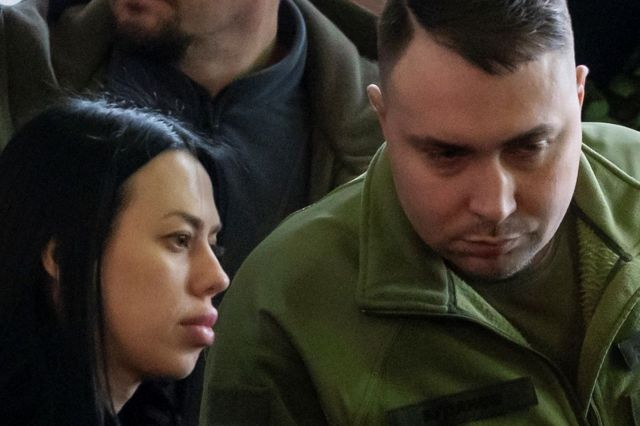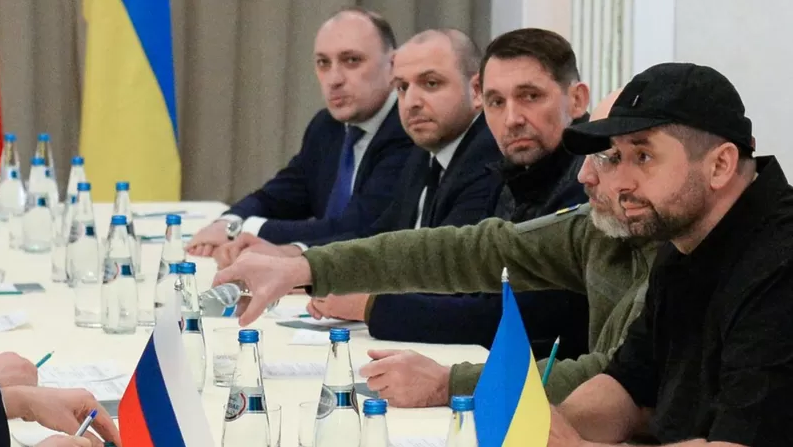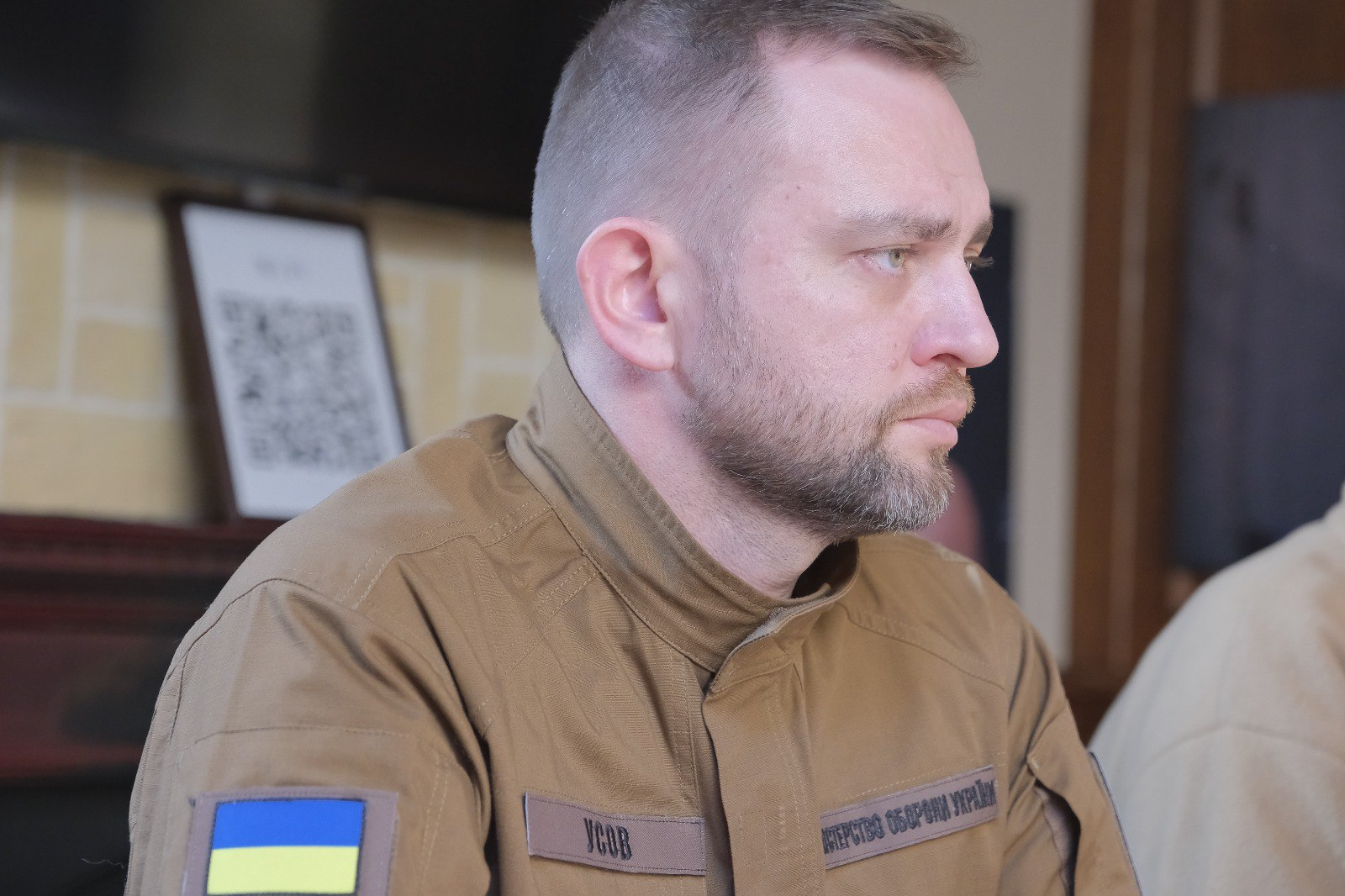Кто доставил яд для «первой леди» ГУР?
Пару дней назад украинское медиапространство, которое уже давно ко всему привыкло и воспринимает как должное очередные коррупционные и криминальные скандалы, удалось порядком встряхнуть. Причиной стала новость о том, что неизвестные пытались отравить супругу главы ГУР МО Украины Кирилла Буданова Марианну. 28 ноября о том, что это правда, заявил официальный представитель ведомства Андрей Юсов. Общество отреагировало двумя вопросами: как и кто?
В отношении «первой леди» украинской разведки применялись беспрецедентные меры безопасности — Марианна постоянно находилась возле супруга, жила в его кабинете. Однако, злоумышленник своего достиг. Ну, почти. Буданова была госпитализирована, но выжила и спустя короткое время пошла на поправку. В её организме врачи нашли следы тяжёлых металлов, которые случайно туда попасть не могли.

Марианна и Кирилл Будановы
Анализы нескольких других сотрудников ГУР показали то же самое, но симптоматика у них либо была намного слабее, либо вообще отсутствовала. Как сказали в больнице, организм Марианны Будановой оказался менее подготовлен ко встрече с отравляющим веществом, чем у агентов мужского пола. Куда вероятнее то, что именно она была целью отравителя и получила наибольшую дозу, тогда как остальные пострадали «по касательной». Но как вообще несостоявшийся убийца смог доставить яд на такую высоту в системе украинской власти? Мы проанализировали несколько версий и пришли к крайне любопытным выводам, которыми поделимся ниже.
Предыстория уводит нас в первые дни СВО. 28 февраля 2022 года в Беларуси прошёл первый раунд российско-украинских переговоров. Впоследствии президент Владимир Путин поделился подробностями — украинская сторона готова была пойти на компромисс и принять условия Москвы, что позволило бы сохранить многие тысячи жизней, но в дело вовремя вмешались западные кураторы киевского режима в лице премьер-министра Великобритании Бориса Джонсона, который, по словам участника переговоров Давида Арахамии, призвал Зеленского следовать принципу «война до последнего украинца». Членом украинской делегации неожиданно оказался Денис Киреев, банкир, в 2010-2014 годах бывший первым заместителем председателя правления «Ощадбанка». Уже потом стало известно — одновременно он был разведчиком, одним из наиболее близких к Буданову лиц в ГУР, получавшим задачи лично от главы ведомства. И в этот раз Киреев, присоединившись к украинской делегации, действовал по просьбе шефа. Сначала не хотел — ранее в его задачи входило наведение связей как на Украине, так и в России, поэтому его поездка в Беларусь в таком качестве могла быть воспринята крайне неоднозначно. С его доводами был согласен и сам Буданов, впоследствии заявивший СМИ о том, что, отправив Киреева на переговоры, фактически раскрыл его как агента спецслужб, но сделал это, потому что того требовала ситуация. Однако, официально о том, где работает банкир, никто тогда не говорил. Поэтому сразу после его появления в переговорной группе по высоким кабинетам на Украине поползли слухи — Россия заслала своего шпиона, который на переговорах будет проталкивать нужный ей результат. Дошли подозрения и до СБУ. И там решили действовать.

Украинская делегация на российско-украинских
переговорах в Беларуси.
Денис Киреев первый слева
Неизвестно, подсказал ли кто или сработало политическое чутьё, но после первой встречи Киреев почувствовал неладное и захотел выйти из игры. Однако шеф не разрешил. 3 марта банкир-разведчик отправился на второй раунд переговоров, в этот раз в Брест. Возвращаясь в Киев 5 марта, он уже знал, что дело может принять скверный оборот, и поэтому предупредил свою охрану, что его могут задержать сотрудники СБУ и что оказывать сопротивление им не нужно. Так и случилось. Киреева «взяли» прямо на вокзале. Через полтора часа его нашли мёртвым, а ещё через несколько часов СБУ отчиталась о «ликвидации российского шпиона». Точно такой же тон взяли и депутаты Верховной Рады. Результаты работы службы высоко оценили Алексей Гончаренко (из партии Петра Порошенко «Европейская солидарность») и бывший депутат партии «Слуга народа» Александр Дубинский, считавшийся человеком олигарха Игоря Коломойского. Ни у кого из них сомнений в том, что Киреев совершил государственную измену, не возникло.
Но уже совсем скоро в бочку мёда добавили дёготь. Поступила реакция из ГУР. Буданов рвал и метал. Сначала он обратился лично к Зеленскому, потребовав возбудить уголовные дела в отношении сотрудников СБУ, причастных к убийству Киреева. Но на этом глава разведки не остановился, призвав на помощь также западных кураторов, чтобы те оказали давление на президента Украины и добились возбуждения дел. Желая подкрепить свои слова, Буданов дал интервью радиостанции «Свобода», в котором заявил о том, что имена всех виновных сотрудников СБУ установлены и от кары они не уйдут. И первым, о ком было заявлено публично, стал начальник контрразведывательного управления СБУ Александр Поклад. Именно он отвечал за поиск в ведомстве лиц, сотрудничавших с российской стороной. Буданов сообщил о том, что Кирееву звонили из офиса Поклада прямо перед поездкой в Беларусь, но деталей разговора не привёл.
Поначалу Буданову вроде бы мало что удалось. Киреев был официально признан сотрудником разведки, погибшим при выполнении некоего задания, он был с почестями похоронен и посмертно награждён медалью «за исключительный вклад в защиту государственного суверенитета и государственной безопасности». Одновременно с этим украинские СМИ начали распространять слухи о том, что убитый чуть ли не решил исход всего конфликта, якобы предупредив Киев о готовящемся десанте ВС России на гостомельском аэродроме. Вместе с тем ни для Поклада, ни для кого-то другого видимых юридических последствий не наступило. Давать публичные комментарии в СБУ никто не стал. По тому же пути решили пойти и в Государственном бюро расследований. На этом инцидент вроде бы себя исчерпал. Однако, в июле 2022 года СБУ внезапно сотрясла громкая отставка. Был уволен ни много ни мало глава ведомства Игорь Баканов — с формулировкой «за ненадлежащее выполнение служебных обязанностей». По словам Зеленского, такое решение он принял на волне большого числа случаев, когда подчинённые Баканова занимались шпионажем в пользу России или мешали работе других силовых органов. Впрочем, почти все участники убийства Киреева остались на своих местах, поэтому в ГУР слишком рано было праздновать победу. Конфликт между двумя ведомствами продолжил тлеть, перейдя на уровень внутренних интриг.
В октябре 2023 года очередная такая интрига, авторство которой, безусловно, принадлежало лично Буданову, привела к увольнению заместителя председателя СБУ Анатолия Сандурского, курировавшего сотрудничество службы с партнёрами в военно-технической сфере. В приказе, подписанном Зеленским, причина увольнения не значилась, но непосредственным поводом, очевидно, послужило обращение Буданова в Национальное антикоррупционное бюро Украины (НАБУ). Впрочем, повод — это именно что не причина. Участие чиновника в коррупционном скандале никак не могло привести к его увольнению в современном украинском государстве, тем более что фигура Сандурского не была объектом нападок в СМИ. Да и шлейф за ним тянулся такой, что на Украине ему светил только карьерный рост — организация диверсий и терактов на территории России, убийство начальника штаба Народной милиции ЛНР Олега Анащенко. И ещё один любопытный факт — одновременно с увольнением Сандурского, как сообщалось, в СБУ было создано секретное «шестое управление», в задачи которого должно было войти налаживание связей с британской разведкой MI6. Оба этих события, если рассматривать их вместе, дают основания предполагать, что Буданов не просто «убрал» личного врага, но и в целом смог добиться того, чтобы СБУ в дальнейшем (как минимум, в части сотрудничества с иностранными партнёрами) во многом зависела от ГУР. В службе, естественно, с таким поворотом событий не согласились и решили «убрать» уже самого Буданова. Первой под раздачу попала его супруга.
Но если всё было именно так, то всё равно остаётся вопрос — кто? По моим источникам в Офисе президента Украины, к отравлению непосредственно причастен Дмитрий Усов, заместитель главы ГУР. Ранее он несколько лет работал в СБУ, в том числе был заместителем начальника главного управления службы по автономной республике Крым (в те годы, когда такой административно-территориальной единицы в составе Украины уже не существовало). Также назывался куратором Главного следственного управления СБУ. Перейдя на работу в ГУР, по слухам, стал «смотрящим» за Будановым со стороны Офиса президента Украины, отчитываясь перед Андреем Ермаком. А ещё после начала СВО занимался непубличными переговорами между сторонами конфликта, возглавляя координационный центр по обмену пленными. В частности, в мае 2022 года курировал сдачу гарнизона «Азовстали».

Дмитрий Усов
Что интересно, некоторые связи с российской стороной Усов поддерживал и ранее. Так, в украинских источниках в его адрес звучали даже обвинения в том, что он фактически помогал ФСБ РФ оказывать давление на отдельных представителей украинского бизнеса, ведущих дела на полуострове, после его вхождения в состав России. Как бы то ни было, но опыт участия в кулуарных интригах у него был немалый. Осенью 2023 года такой человек отлично подошёл бы на роль того, кто соберёт всю необходимую информацию о ГУР, позволяющую организовать доставку яда кому-то из его начальства.
Однако, авторство идеи, вероятнее всего, принадлежало Покладу. Человек, оставшийся на своей должности после истории с Киреевым и при этом фактически являвшийся одним из главных врагов Буданова, разумеется, был сильнее прочих заинтересован в его падении. Любопытный факт — ещё в августе 2023 года ряд экспертов высказывали предположения о том, что именно Поклад может возглавить СБУ после того, как эту должность покинет Малюк — того в ОП давно заподозрили в нелояльности Зеленскому, поэтому кресло под ним далеко не так прочно. Но перевод на столь высокую должность надо заслужить чем-то большим, чем просто лояльность. В ноябре 2023 года конфликт между Зеленским и главнокомандующим ВСУ Валерием Залужным достиг уже почти критической фазы, слухи о готовящемся перевороте зазвучали так громко, что почти перестали быть слухами. Но вместе с Залужным одним из ключевых претендентов на место Зеленского ранее западными СМИ не раз назывался Буданов. Когда в Киеве началась тряска, предприимчивые люди в СБУ поняли, что настал черёд действовать. В результате Поклад с помощью Усова попробовал разыграть комбинацию, чтобы одновременно избавиться от своего опасного врага и выделиться на Банковой, усилив позиции Зеленского за счёт устранения одного из его главных конкурентов.
Как бы то ни было, но эта версия выглядит намного презентабельнее, чем попытки найти в случившемся «российский след». Замахнуться на то, чтобы отправить на тот свет самого Буданова, на Украине вряд ли бы кто-то решился даже в СБУ или армейской верхушке — в условиях межведомственной грызни это могло стать смертным приговором. А вот отравить его супругу, спровоцировав тем самым публичный скандал, охоту на ведьм и чистки в самом ГУР, было бы достаточно для того, чтобы позиции Буданова рухнули без возможности восстановления. Именно поэтому расследование инцидента с отравлением Марианны Будановой, в котором обязательно должна принять участие и СБУ, можно назвать классическим примером, когда следователи в ходе следствия могут выйти на самих себя.
Используемые документы
